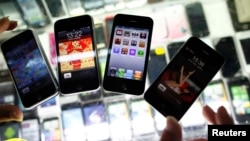Police in Beijing have busted a factory that produced more than 41,000 fake iPhones worth as much as 120 million yuan ($19 million), including some that reached the United States, and have arrested nine suspects in the counterfeiting operation.
Apple is one of the most popular brands in China, where authorities have stepped up efforts in recent years to dispel the country's reputation for turning out counterfeit goods.
Officials have taken stiffer action to enforce intellectual property (IP) rights, pushed firms to apply for trademarks and patents and cracked down on fakes.
Police arrested nine people, including a married couple who led the operation, after a raid in May on the factory, run under the guise of a gadget maintenance shop on the northern outskirts of the Chinese capital.
The details were revealed in a social media posting on Sunday by the public security bureau in Beijing.
The group, headed by a 43-year old man, surnamed Yu, and his 40-year old wife, surnamed Xie, both from the southern hardware manufacturing city of Shenzhen, allegedly set up the Beijing factory with six assembly lines in January, the bureau said.
They hired "hundreds" of workers to repackage second-hand smartphone components as iPhones for export, it added.
Police seized 1,400 handsets and large quantities of accessories during the May 14 raid. In the United States, the newest Apple Inc. handsets can fetch $649, or more, depending on the model.
Beijing police said their investigation followed a tip-off from U.S. authorities who seized some of the fake devices.
The destination of the counterfeit phones, and how many made it there, remains unknown.
Public security representatives declined to comment on Monday, telling Reuters they had no additional information. Apple also declined to comment, saying the investigation was ongoing.
It is not the first time China has uncovered plots to exploit the popularity of Apple products.
In 2011, bloggers in the southwestern city of Kunming discovered more than a dozen unauthorized brick-and-mortar outlets that carefully replicated the interior decor, and even employee uniforms, used in genuine Apple stores.
The viral pictures embarrassed officials, who vowed to do more to protect trademarks.
($1=6.2096 Chinese yuan renminbi)





